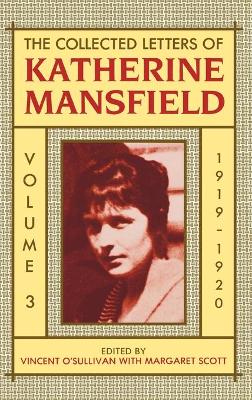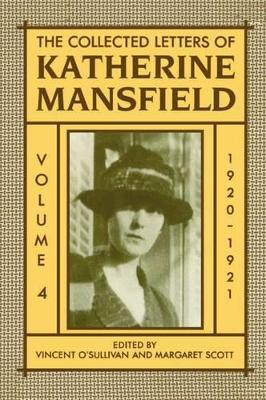Collected Letters of Katherine Mansfield
4 total works
The third volume of the Collected Letters of Katherine Mansfield covers the eight months she spent in Italy and the South of France between the English summers of 1919 and 1920. It was a time of intense personal reassessment and distress. Mansfield's relationship with her husband John Middleton Murry was bitterly tested, and most of the letters in this present volume chart that rich and enduring partner'ship through its severest trial. This was a time,
too, when Mansfield came to terms with the closing off of possibilities that her illness entailed. Without flamboyance or fuss, she felt it necessary to discard earlier loyalties and even friendships, as she sought for a spiritual standpoint that might turn her illness to less negative ends. As she put it,
'One must be ... continually giving & receiving, and shedding & renewing, & examining & trying to place'.
For all the grimness of this period of her life, Mansfield's letters still offer the joie de vivre and wit, self-perception and lively frankness that make her correspondence such rewarding reading - an invaluable record of a `modern' woman and her time.
too, when Mansfield came to terms with the closing off of possibilities that her illness entailed. Without flamboyance or fuss, she felt it necessary to discard earlier loyalties and even friendships, as she sought for a spiritual standpoint that might turn her illness to less negative ends. As she put it,
'One must be ... continually giving & receiving, and shedding & renewing, & examining & trying to place'.
For all the grimness of this period of her life, Mansfield's letters still offer the joie de vivre and wit, self-perception and lively frankness that make her correspondence such rewarding reading - an invaluable record of a `modern' woman and her time.
This volume, the second of four, includes her correspondence from early 1918 to the autumn of 1919. Her love for Middleton Murry, her response to the First World War, and her acceptance of the inevitable advance of tuberculosis, are handled with wit and warmth, in a text which has been transcribed afresh from the original letters.
The letters is this volume cover the eighteen months katherine Mansfield spent in England, France, and Switzerland from May 1920 to the end of 1921. It is the period of her finest stories, and when her life took its most decisive turn. There is a subtle but unmistakable change in her expectations, a new 'spiritual' insistence that is both elusive and resolute. From her Chekovian acceptance that 'they are cutting down the cherry trees' she derives a tough existential directness: 'the little boat enters the dark, fearful gulf...Nobody listens. The shadowy figure rows on. One ought to sit still and uncover one's eyes.' There is a determined push - not always successful - towards a necessary honesty, as much as to artistic achievement; while those qualities of her earlier correspondence remain undiminished - the precision and directness, the intelligence and wit, the dark incisiveness as much as sheer fun. Above all, perhaps, these letters comprise a record of very considerable courage, against increasingly adverse odds, as they approach the final years of her life.



